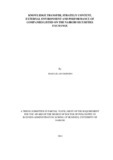| dc.description.abstract | The generation and transfer of knowledge is vital source of a firm’s competitive
advantage. In order to identify business strategies, expand businesses and develop
competitive advantage, organizations need to scan the environment and align the
managerial processes with the environment. Since companies listed on the Nairobi
Securities Exchange ensure optimal performance, they may mobilize organizational
change through the deployment of modes of knowledge transfer, translation of
strategy, alignment of organization to strategy and scanning the external environment.
The study examined the influence of strategy content and external environment on the
relationship between knowledge transfer and organizational performance of
companies listed on the Nairobi Securities Exchange. Using a structural questionnaire,
data on the study variables were obtained from 36 companies listed on the Nairobi
Securities Exchange and were analyzed using descriptive and inferential statistics.
Overall, the study findings reveal the influence of strategy content and the varying
degree of environmental dynamism on the relationship between knowledge transfer
and organizational performance. Specifically, knowledge transfer has significant
effect on organizational performance. Knowledge transfer has significant effect on
strategy content. External environment has no significant moderating influence on the
relationship between knowledge transfer and strategy content. Strategy content has
significant intervening influence on the relationship between knowledge transfer and
organizational performance. The joint effect of knowledge transfer, strategy content
and external environment on organizational performance is significantly different
from the independent effect of variables. Theoretical implications of the study
illustrates full support of the dynamic theory of organizational knowledge creation
through socialization, internalization, externalization and combination, industrial
organization economics theory through environment-strategy-performance; and partly
support of the knowledge based theory through knowledge transfer within the
organizations, the contingency theory through environmental dynamism and
stakeholders theory through customer, internal business process and learning and
growth perspectives. Methodological implication shows the operationalization of
knowledge transfer as independent variable, external environment as moderating
variable, strategy content as intervening variable and organizational performance as
dependent variable. The non-financial and financial indicators of the variables were
measured using the likert scale and the ratio scale respectively. Managerial
implications illustrate that organizations that embrace the balanced scorecard
performance measurement employ the modes of knowledge transfer to develop their
strategy content of strategic stances and actions within their industry in dynamic
environment. The researcher recommends future research on knowledge retention and
other concepts of knowledge management using longitudinal and case studies and
specify the absolute number of companies that use the balanced scorecard as a
performance measurement tool. | en_US |

